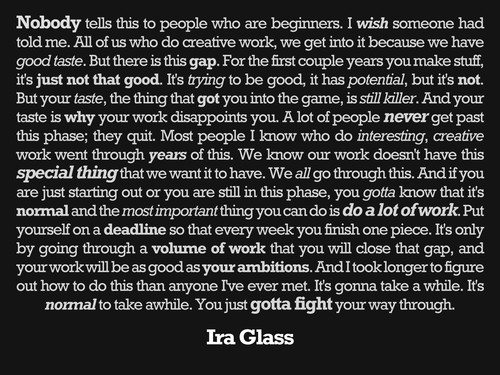The biggest fear I hear from my readers is: “I don’t want to fail.” The painful uncertainty of this career choice is palpable, especially for the post-grad set. There are times I can feel it oozing from my screen when I read, “I don’t know what I would do if I fail…” You just know that there’s some vision hovering above them of a parent’s basement, Seinfeld reruns, and a meaningless office job. That vision comes into even clearer focus each time they open a bill for their student loans. As much as we all try, it is difficult to watch our friends (seemingly) succeed in their endeavors while we toil away at our own mission.
I am here to tell you – You Are Not Failing. You are making it happen.
Have you sung this week? Have you been working on a role or recital repertoire? Have you updated your résumé, website, bio, headshots, Facebook page, whatever? Have you promoted a musical event? Have you been following the news in your field? You are doing it. You are taking an active part in your long-term career goals by taking little steps now.
There is a short phrase that I like to tell myself when I need a inspirational boost, “upping your averages.” What does “upping your averages” mean? In baseball, the batting average (BA) is defined as the quotient of hits divided by at bats. It means that if you have done only two singing-related things this week and one of them went poorly – you’re average is sitting around .500. (Which is where the baseball and singing averages part ways.) However, if you “up your averages” to fifteen singing-related activities and you’re hitting twelve of those things out of the park – your average has gone up to a cool .800. Try upping your averages to recognize all the ways you aren’t failing. Or, of course – read this Ira Glass quote:
Fear of failure is one of the sneaky pitfalls of perfectionism. Perfectionism, at times, is cloaked as a good thing. It leads to high achievement motivation. Sadly, it can also lead us to underachievement. Perfectionism may lead us to feel anxiety or fear that we cannot meet our high expectations. This is particularly prevalent in the opera business. Singers often buy-in to the negative self-talk about the competitiveness of the industry – only the best technique, best audition outfit, best aria package will win. Sometimes singers avoid the basic day-to-day experiences and duties because they just “aren’t ready yet.” This type of perfectionism is very different from motivation for excellence. Motivation for excellence is about upping those averages – taking little steps each day and each week to reach your goals regardless of what your friends and colleagues are doing.
Succeeding in opera often translates into succeeding comparatively to others. It is necessary that we develop means of measuring success against ourselves. Take a moment to define what excellence looks like regarding your goals. Write down specific actions that will help you achieve that excellence. Seriously, write them down. Start doing them.
You ARE making it happen. You are NOT failing. Just keep singing.
Related articles
- How do high achievers really think? (psychologytoday.com)
- Ring the Bells That Still Can Ring: Letting Go of Perfectionism (psychcentral.com)
- How Striving for Perfect Can Kill Your Career (money.usnews.com)


Nice! Good pep talk and ALWAYS relevant
Thanks, Lindsay! Sometimes we all just need the reassurance.
These words are very encouraging, hopeful. They sound a little familiar, too
I swear, if you had directly posted one of our gchats into this post, I wouldn’t have been surprised. Thanks for lifting me up when I was falling, as always <3
I appreciate your creativity and the effort you put into every post. Keep up the great work!